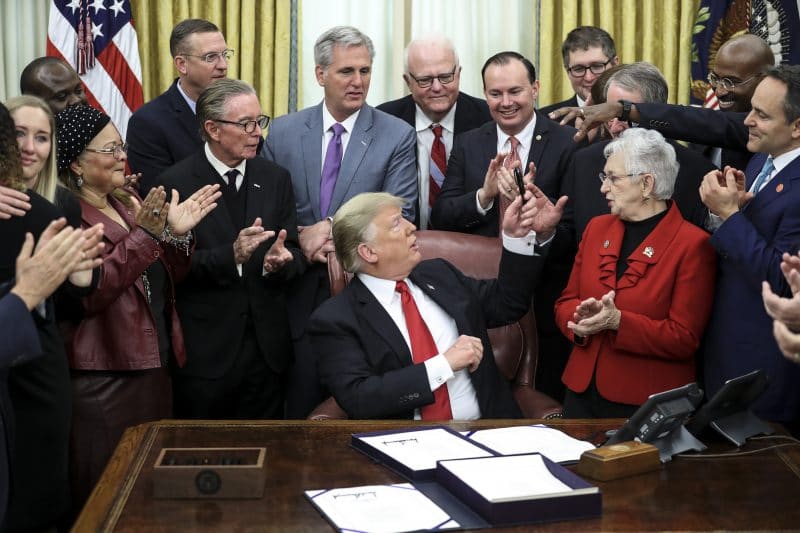Seeking Unity Beyond Partisan Lines: Why I Went to CPAC
COMMENTARY

Three years ago, I flew to Florida to attend the Conservative Political Action Conference, the country’s most prominent gathering of right-wing political activists. As a lifelong progressive from New York City, I surprised even my Republican friends, who considered CPAC extreme.
I went to connect with conservative criminal justice partners and better understand how a large swath of the country thought. After an entertaining, educational and sometimes unnerving few days, I started a multiyear commitment to passing bipartisan, common-ground criminal justice legislation across the country.
Last week I went back for CPAC 2024. The experience strengthened my belief that the opportunity to bring the country together on issues like criminal justice is more real than the forces of division would have us believe.
As an organizer, civil rights lawyer and criminal justice campaign director, I’ve spent my career committed to social justice. After spending two decades in the trenches with activists, I came to my current organization, Dream.Org, because of its commitment to both centering directly impacted people and working towards common-ground solutions.
I’d become convinced that too much of the criminal justice movement was ill-equipped to pass meaningful reforms in Republican-controlled states, the very places with the worst prison conditions and highest incarceration rates. People who are most impacted by our criminal justice system don’t care if changes come from Democrats or Republicans, and I was determined to work with whomever necessary to pass reforms.
The American Conservative Union, which hosts CPAC, is pretty good on criminal justice reform. On most issues, they are as right wing as they come, but their commitment to reform, grounded in conservative principles, can appeal to Republican governors and legislators. In 2021, I got to meet many conservative leaders from the criminal justice space for the first time, and over the last few years, I’ve worked with many of them at the state and federal levels.
My first-year experience at CPAC in 2021 helped me understand the MAGA movement. Being in a hall packed with conservative activists, I got a sense of who was popular and charismatic with their base — Sen. Ted Cruz, R-Texas — and who wasn’t — Sen. Tom Cotton, R-Ark. South Dakota Gov. Kristi Noem impressed the room, coming off as a savvier Sarah Palin, and I thought then, as I do now, that she would be a formidable vice-presidential candidate.
I vehemently disagreed with the conference speakers on a range of issues, from stolen election theories to the demonization of transgender individuals. However, I did come to better understand conservative grievances, fueled by a belief that Democrats control many entities in America.
These grievances manifest in political outcomes like high voter turnout in midterms or the Jan. 6, 2021, riots at the Capitol.
This year at CPAC serious conversations took place in hotel meeting rooms while the circus carried on in the hallways. For hours, elected officials and advocates talked through thorny issues around crime, messaging, data and potential bipartisan solutions.
Criminal justice reform, for all of its recent setbacks, remains one of the last bastions of bipartisanship in American politics, even as the historic 2018 First Step Act, which my organization and many groups from across the political spectrum worked on, recedes further into the rearview mirror. There are plenty of people left, right and center who will not let that die without a fight, and who will keep pushing for that second step.
CPAC 2024 was also a snapshot of a Republican Party in transition, wrestling with the retirement of many of its thoughtful dealmakers and the ascendance of elected officials who just want to tear everything down.
The overwhelming consensus was that between the failed leadership of Speaker Mike Johnson, R-La., and the rancor of election-year politics, 2024 will not be a year to get things done in Washington. We face a unique election cycle where the presidency, Senate and House could all cut either way.
The most realistic outcome is that we will have a divided government for another two to four years, perhaps longer. As one of my conservative colleagues remarked as CPAC wound down, that will be the time for sane and sober people to come together.
I refuse to give up and concede that we’ll achieve nothing during that time — nothing for people behind bars, nothing for communities left behind.
Bridges are built when people on both sides show a willingness to reach across a divide. For all the negative stories we will hear coming out of CPAC in the days ahead (some of it called for), I appreciate the space they made for progressives like me to participate in a conservative criminal justice conversation, and it’s an invitation I’ll accept any time.
I hope conversations with unlikely allies can mark the beginning of a journey that brings Americans together to create change.
Janos Marton is the chief advocacy officer at Dream.Org. Marton ran for Manhattan district attorney in 2020 on a platform of responsible decarceration and continues to champion policies that prioritize people over prisons. He can be reached on LinkedIn or X.
























